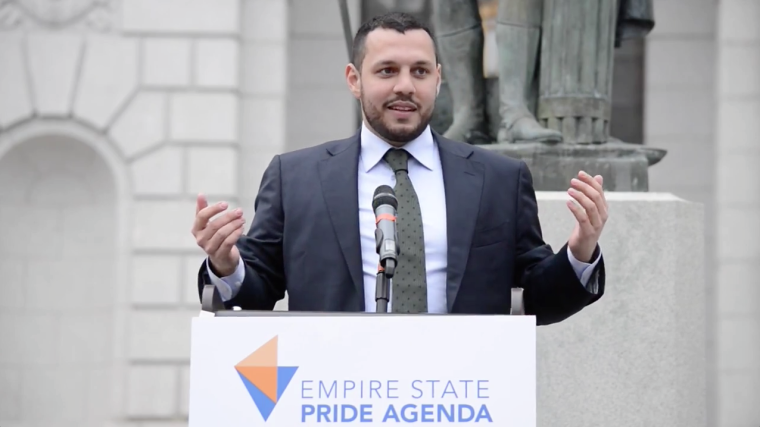A Great Neck native is leading the charge to have gay conversion therapy practices banned throughout the state after his experience with the controversial practice.
Mathew Shurka, 26 and now a native of Brooklyn, spoke last week before the state Assembly and Senate, urging lawmakers to ban the practice of gay conversion therapy for patients under the age of 18.
“To date there’s been no scientific evidence that conversion therapy works,” said Shurka, an openly gay man.
Shurka said he has also spoken to lawmakers in California and New Jersey, who have passed laws banning the practice.
Shurka said the reason the bill is before the Assembly and Senate is because mental health professionals are “issued their licenses through the state.”
The state Assembly passed the bill 86-28 on Monday. The state Senate had not voted on the bill at press time.
Under the bill proposed by state Assemblywoman Deborah Glick, an openly gay assemblymember from Manhattan, any mental health-care professional found engaging in any gay conversion therapy with a patient younger than 18 will have their license “revoked, suspended or annulled.”
The bill states that lesbian, gay, bisexual and transgender youth who have been forced to participate in gay conversion therapy sessions have experienced “critical health risks” including depression and substance abuse.
Shurka said he, too, experienced “anxiety and panic attacks” during the five years he was in conversion therapy.
“The evidence of harm is out there,” Shurka said. “There’s a numerous amount of evidence of people who undergo this therapy who contemplate suicide.”
Shurka said he endorsed the bill because he was forced to undergo gay conversion therapy by his father at the age of 16 and was sent to four different doctors over the course of five years.
“My dad had the fear that many parents have and that’s discrimination,” Shurka said. “He didn’t want his son to be discriminated against.”
Shurka said his father found a therapist working out of Manhattan who told him that gay conversion therapy would help turn his son heterosexual.
“He found this doctor who said that homosexuality is a psychological condition that could be cured,” Shurka said. “[Conversion therapist’s] think that everyone is heterosexual and that men had a traumatic experience that made them think they’re gay.”
The doctor told Shurka to stop speaking to any women, including his mother and sisters, and to only speak to men.
“The idea was to not pick up any effeminate behavior,” Shurka said. “I spent three years not talking to my mother.”
Shurka said the only positive thing about the therapy was that it made him “popular.”
“I had someone my parents were paying for teaching me how to be one of the guys,” he said. “I became extremely popular in high school.”
But, Shurka said, his grades began to drop and he started suffering from anxiety and panic attacks.
He said he was also “forcing myself to sleep with women.”
Shurka said he entered into a relationship with a man at Baruch College, but that relationship was stopped when his father asked the other man to never see his son again.
“I found out eight months later,” Shurka said. “At that point I became estranged with my father and started talking to my mother again for the first time in three years.”
Shurka said, however, he continued to force himself to continue to go to conversion therapy sessions but stopped two years later at the age of 21.
He said he publicly announced that he was gay in January in 2012 and in October of 2012 became inspired to advocate for the prohibition of conversion therapy.
“I heard California Gov. Jerry Brown publicly denounce the therapy,” Shurka said. “That’s when I knew I no longer had to hide this nightmarish past.”
Shurka has since gone on to write several articles on the topic, including one with one of his former conversion doctors.
He said he has also made peace with his father.
He said he was contacted by Empire State Pride Agenda to speak to the New York State Senate and Assembly regarding the bill.
He said he hopes the if the bill is passed into law, parents and medical professionals will see the “red flags” of the therapy.
“If parents see that this practice has been banned, they might question it,” Shurka said.



